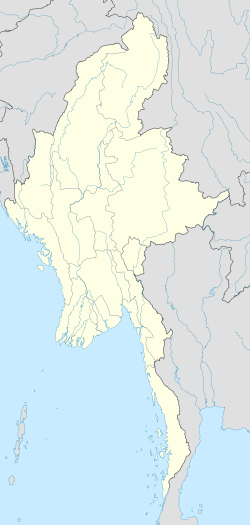Pyuntaza (Burmese: ပြွန်တန်ဆာမြို့; MLCTS: pywan ti cha mrui.; also spelt Pyuntasa) is a small town located in Nyaunglebin Township, Bago District, Bago Region, Myanmar. It is about 70 kilometres (43 mi) from Bago (formerly Pegu).
Pyuntaza
ပြွန်တန်ဆာမြို့ | |
|---|---|
Town | |
| Coordinates: 17°52′N 96°44′E / 17.867°N 96.733°E | |
| Country | |
| Region | |
| District | Bago District |
| Township | Nyaunglebin Township |
| Time zone | UTC+6.30 (MST) |
The dominant ethnic group is Bamar, although there is a substantial number of Karen. The town's main economy consists of rice cultivation and distribution.
Etymology
editThe name Pyuntaza comes from the Mon language term plaem sotchaek (ပလီုသစ္စ, Mon pronunciation: [pəlɜ̀m sɔtcɛˀ]), which means "to break vows."[1]
History
edit| Year | Pop. | ±% |
|---|---|---|
| 1891 | 23,132 | — |
| 1901 | 52,952 | +128.9% |
| [2] | ||
In the colonial era, Pyuntaza was administered as a township of Pegu District in Lower Burma, covering an area of 1,443 square miles (3,740 km2) and consisting of 232 villages.[2] The township's population in 1901 was 52,952 persons, having more than doubled since 1891 (23,132).[2] The western flank of the former Pyuntaza Township is hilly, while the eastern half is a flat rice-producing area.[2]
From 1920 to 1931, with the emergence of a national railway system extending north–south, Pyuntaza emerged as a railway center town, along with neighbouring Daik-U.[3] By rail, Pyuntaza was 88 miles (142 km) from Rangoon (now Yangon).[4]
During World War II, prominent Burmese barrister U Chan Htoon retreated to Pyuntaza as his place of retirement.[5]
References
edit- ^ Ko Banyar Be (7 November 2013). "မွန်တို့ဌာနေ ရာမည တိုင်းက မွန် အခေါ်အဝေါ်များ" (in Burmese). Burma News International (BNI). Retrieved 25 June 2015.
- ^ a b c d Henry Frowde, ed. (1908). The Imperial Gazetteer of India: Pushkar to Salween. Vol. XXI. London: Oxford Clarendon Press. pp. 12–13.
- ^ "A Preliminary Review on the Urbanization of Bago (Pegu) Division of Myanmar (Burma)". Research on Urbanization in Burma/Myanmar. 25 September 2020. Retrieved 28 August 2012.
- ^ Office of the Chief Secretary to the Chief Commissioner, ed. (1893). Notes and Statistics in Four Parts. Rangoon: Government of Burma. p. 273.
- ^ Maung Maung (2008). Robert H. Taylor (ed.). Dr. Maung Maung: Gentleman, Scholar, Patriot. Institute of south-east Asian Studies. pp. 114. ISBN 9789812304094.
